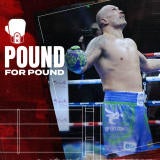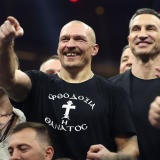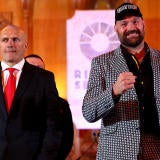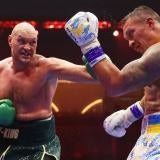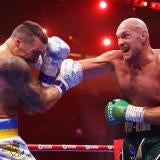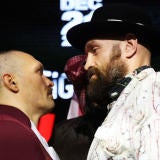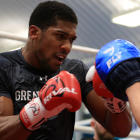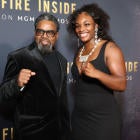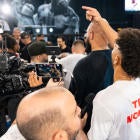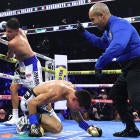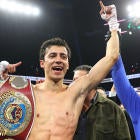Ever since Lennox Lewis retired as champion in early 2004, effectively ending whatever positive hangover remained from the last great heavyweight era of the 1990s, the division has been sorely lacking in terms of anything resembling buzz.
Wladimir Klitschko scooped up the ailing division in 2006 and (at times with older brother Vitali Klitschko reigning beside him) built a historic resume of consistency with 18 consecutive title defenses. But for as much as Klitschko needed the division's platform to elevate himself, he was never able to become the breakthrough star in the U.S. that the division needed most.
Since Lewis left, heavyweight boxing has lacked great fights, transcendent fighters and the depth of elite opponents for its champions to face. But most importantly, it has lacked that one global crossover name to hold its foundation in place.
That name that the division needs most just might be unbeaten (but still unproven) titleholder Anthony Joshua of Great Britain, which makes Saturday's crossroads matchup against Klitschko in London the most important heavyweight fight in 15 years.
Joshua (18-0, 18 KOs) has everything someone hailed as "boxing's next big thing" should: good looks, a chiseled 6-foot-6 frame, power in both hands and an amateur pedigree which includes a gold medal at the 2012 London Olympics.
The native of Hertfordshire, England, also has an incredible following (90,000 fans are expected at Wembley Stadium) and an early penchant for drawing big money (after this weekend, promoter Eddie Hearn believes Joshua will have earned $25 million British in just 19 bouts including purses and endorsements).
The only thing Joshua, 27, has lacked is a breakthrough and critical victory that officially launches him into worldwide stardom and sets his course for domination upon American soil. A victory over the former champion Klitschko, 41, could give him just that.
"If we can cross over into the States and still keep the fan base of the U.K., I think we cracked it," Joshua said during Wednesday's media teleconference. "I think that's mega stuff, that's global. You have a big guy, a heavyweight, with a name that's easy to pronounce. I can speak English well and I can relate to the U.S. market.
"So all I have to do is come out there and fight to show them what my trade is. Hopefully they will appreciate it and we can talk about setting up some major fights to bring the same attention from the U.K. to the U.S."
Joshua will make the third defense of the IBF title he won by knocking out Charles Martin in April 2016. He will also be competing for the vacant WBA title; the same belt Tyson Fury gave up last October to focus on his recovery from mental health and substance abuse issues, one year after upsetting Klitschko to commandeer his trio of world titles.
Accepting such a big fight this early in his pro career was something Joshua felt a responsibility to take on. In some ways, he stumbled into the title shot against the underwhelming (and grossly untested) Martin faster than expected in his 16th pro fight.
"I felt [a big fight] was bound to happen and I felt the division needed it," Joshua said. "I'm not doing it just for myself. What type of era are we if we don't come together and have trilogies and bring some excitement?"
Joshua said that if he wasn't willing to put this much pressure on himself so early in his development, he would've taken another route for his profession. After turning pro in 2013, Joshua wasn't interested in waiting six to nine years before making a run at the top of the division.
"When two heavyweights are coming together and are willing to lay it on the line, it's an amazing time for boxing in that sense," Joshua said. "It's real mainstream. There's a massive benefit for Klitschko, win or lose, to see if he has another fight in him or if he's just done. As long as my heart was beating, I thought I would be involved in such a mega showdown."
"Love boxing? Don't forget to subscribe to my podcast In This Corner with Brian Campbell where I break down some of the biggest fights and fighters in the sport each week."
Joshua admits that one day facing off with Klitschko was never his focus and it wasn't until last year -- in the aftermath of the former champion's stunning loss to Fury -- that he first gave serious consideration to the idea.
That doesn't mean the two fighters don't have history, however. Klitschko brought in a young Joshua to his Austrian training camp in 2014 as a sparring partner ahead of his knockout victory over then-unbeaten Kubrat Pulev. The two sparred between 20 and 25 rounds, but Joshua insists it was never his intention to fight at full speed or test himself against Klitschko at that time.
In fact, when another sparring partner at the gym implored him in the corner between rounds to "Stick it to the champ," and come back hard at Klitschko, Joshua was quick to respond that he wasn't there for that.
"I always say I'm not a gym fighter so I don't go and prove anything in the sparring," Joshua said. "I went in there mainly just to look at how a champion sets up training camp. Our sparring was good, Wladimir is technical. He tries to maneuver you with his left hand to put you in position to land his right hand. He's patient, he was just trying to set me up so he could throw his shots."
Despite entering the fight with such a profound disadvantage in terms of experience, Joshua isn't worried Klitschko's constant holding, which depending upon the referee in each fight, has played a big part in stifling his opponent's offense.
"I think holding is natural. At the end of the day it's what you do against someone that's holding," Joshua said. "How would you fight them off? You bring up the uppercut, you whip up the right hand to the body. It's a fight. I can't prevent the holding, but it makes it interesting what a fighter does when someone is holding."
If victorious, Joshua expects to make his U.S. debut shortly after and is wiling to take on the best right away, including unbeaten slugger Deontay Wilder (38-0, 37 KOs), saying, "If he wants some of this as well, we can definitely get it on ASAP. It's no problem."
But before he can begin his goal of taking over the heavyweight division -- and eventually the world -- Joshua must first prove the hype that has surrounded him is for real. When all is said and done, he believes we'll have an answer sooner than later on Saturday.
"I'm not into this 12-round boxing," Joshua said. "It would be sweet to knock Wladimir out because that's what heavyweight boxing is all about, right? I think that would be sweet."

